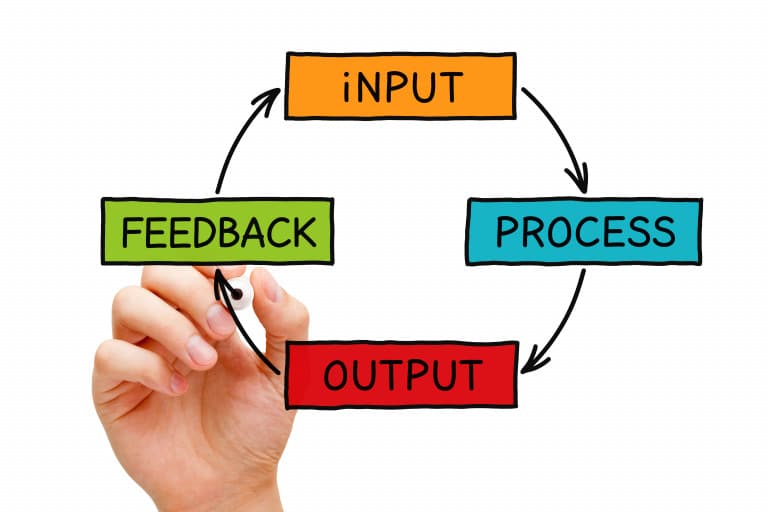This article provides a 4-step process that sales managers can use to install a continuous feedback loop with their salespeople. Having a feedback loop is essential for building a sales team that achieves consistent sales growth through ongoing improvements in team members’ sales skills and attitudes.
I was talking recently with a new sales manager who had just completed my online sales management training course. He told me he’d been really focused on looking at the revenues and margins generated by his salespeople. But he’d come to realize that he didn’t have any mechanism for creating a feedback loop that would lead to continuous improvement. “I have to be clear about what I need them to do, then observe what they do, then help them identify what they need to improve. And then keep that loop going.”
Expectations communicated to salespeople. Analysis of what they’ve accomplished. Plans for improvement. Repeat. That’s the kind of loop this young sales manager was talking about. I advised him to focus on four steps:
Define and communicate standards of excellence
When I was a rookie sales manager, I did NOT clearly define nor communicate to my team that there were high standards I wanted them to live up to. I think few sales managers have taken that step.
There may be some performance standards tucked away in a drawer (or online) somewhere, but not the kind that are useful in setting daily expectations for behavior and professional development. I frequently see sales managers set standards that define minimum performance levels that salespeople need to achieve to keep their job. I call these “standards of mediocrity.”
What sales managers should be doing instead is to set the bar much higher by defining standards of excellence.
How? Sales managers should start by looking at what they did to excel in the sales profession and also look at what the best salespeople on their team are doing now. With this information, they can be very specific in describing the skills and attitudes that are characteristic of high performers.
That information plus documentation of any outcomes (such as sales quotas) can be used to create a “team success profile” that documents the sales manager’s standards of excellence.
Have salespeople grade themselves
Once a sales manager has the standards of excellence in place, they should have their salespeople grade themselves on how well they are doing against each item in the profile. You can use either a typical “1 to 5” scale or a simpler “needs work” vs “acceptable” scale. Ideally, the sales manager grades each individual salesperson as well.
Analyze the results and discuss them with the salesperson
The sales manager and sales rep would then sit down, compare their ratings, discuss the findings, and identify priority areas for improvement.
Typically, the improvement areas identified will be either areas where the salesperson lacks the skill or knowledge to do a better job (i.e., lacks training), or has the knowledge do but lacks the will or attitude to make them successful (i.e., a motivation issue).
Keep the loop going
I suggest sales managers go through the grading/discussion process at least quarterly. Making it a regular occurrence is essential. Not only does it send a message that you’re paying attention to each salesperson, but it allows you to track their progress over time—Have they improved in the last few months? Are they stagnating or getting worse?
Remember, a performance standard for salespeople is only a standard if you coach your team to achieve it and take action if someone falls short.
Enforcing Excellence
Having sales performance standards documented, communicated, and reviewed becomes the cornerstone for continuous improvement on a team. If someone consistently falls short and fails to improve, you as the sales manager must take action immediately. And if someone consistently improves, you’ll know you’re creating a team of high achievers.
Kevin F. Davis is the author of “The Sales Manager’s Guide to Greatness” book and online training course, which motivates sales managers to maximize the quality of their sales coaching, improve sales performance, and ramp-up new-hires faster. For more information contact Kevin through his website at TopLine Leadership, Inc.


